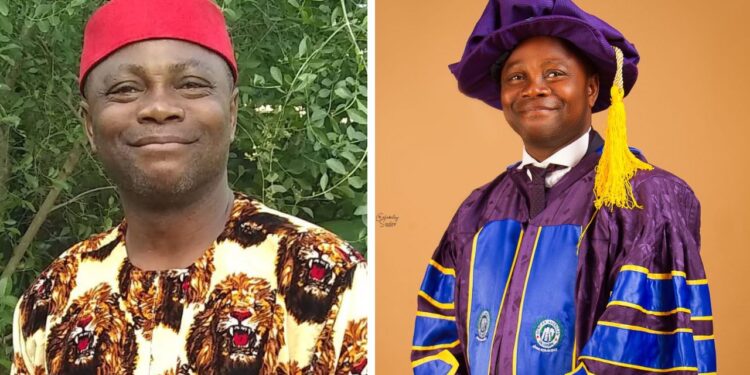In a world increasingly fascinated by the intersections between science, art, and psychology, one Nigerian scholar has quietly—but powerfully—emerged as a leading voice in an often overlooked field: graphoanalysis, the scientific study of handwriting as a window into human personality and cognition.
Professor Ikechukwu Benjamin Ezeohagwu, popularly known as Prof Ben Ezeohagwu, is not only the first Nigerian Professor of Graphoanalysis, but also the first Black African to attain that title.
Born on 29 August 1970 in Mgbidi, Enugu State, his life is a testament to academic excellence, creative intellect, and an unwavering belief in Africa’s capacity to pioneer knowledge for the world.
A lifelong passion for learning
Ben Ezeohagwu’s educational journey is nothing short of extraordinary. From his early schooling in Osun and Enugu States, to diplomas and degrees obtained in Nigeria and the United States, he has accumulated a vast reservoir of knowledge in comparative arts, fine and applied arts, education, graphopsychology, and graphoanalysis.
Holding a First Class degree in Graphopsychology from the British American University, Florida, and several postgraduate qualifications in the same field, he went on to become a Professor of Graphoanalysis at multiple international institutions, including the University of Business Technology, Wilmington, Delaware, and Edexcel University, Republic of Benin. His academic and professional credentials span both the sciences and humanities—a rare feat in today’s highly specialised world.
Inventing the future: BENEZOGRAFS and Neurographiasical Graphoanalysis
What truly distinguishes Prof Ezeohagwu is not just his scholarship, but his innovations. In 2012, he developed BENEZOGRAFS, a graphical–statistical graphoanalysis system designed to depict psychographic energy waves in handwritten documents. This invention has transformed the way handwriting is analysed—offering deeper insights into cognitive and neurological functions through graphological methods.
Building on this, he advanced Neurographiasical Graphoanalysis—a system for identifying and measuring brain energy waves through handwriting. These developments aren’t just academic exercises; they have potential applications in education, behavioural therapy, neurology, and even criminology.
Pushing boundaries in Art, Literature, and Psychology
Prof Ezeohagwu’s work is deeply interdisciplinary. He introduced Comparative Psychovisual Art Analysis, which uses graphoanalysis to examine visual artworks and reveal hidden personality traits of the artists. He also pioneered Comparative Psychogestural Graphoanalysis, a method that analyses human movements—such as walking, sitting, or fighting—to decode behavioural patterns and psychological states.
These methodologies were famously applied in his article “Dereck Chauvin’s murderous actions and comparative translational graphoanalysis correlates”, merging social critique with empirical graphological insight.
Recognition and honours
Prof Ezeohagwu’s groundbreaking work has not gone unnoticed. He is a tripartite awardee of the Culture and Creative Art Forum (CCAF), the Society of Nigerian Artists (SNA), and the School of Art, Design and Printing at Yaba College of Technology. He was named the Chinua Achebe and Wole Soyinka Graphological Research Scholar by Neptune Prime in 2019, and received an International Partnership and Consultancy Award from Escae University, Benin, in 2017.
- He holds numerous fellowships, including:
- Fellow, Institute of Graphoanalysts, Nigeria (FIGAN)
- Fellow, Institute of Crisis Resolution, Peacebuilding and Conciliation (FICRPC)
- Fellow, Graphological Science Society (FGSS)
- Master Artist, Society of Nigerian Artists (MSNA), among others.
In 2020, global handwriting expert Bart Baggett and Handwriting University honoured his BENEZOGRAFS system for its contribution to expanding the field of graphology.
A voice for Africa’s intellectual renaissance
In 2017, Prof Ezeohagwu became the first Black African winner of the Onigraffiks Prize in Literature, specifically for his pioneering work in graphological literature.
Beyond his academic life, he serves as the Director and Founder of the African American Business School, and the Chancellor and President of the African American University—platforms through which he champions African education and enterprise globally.
Legacy and continuing mission
Prof Ezeohagwu’s work is not merely about handwriting; it is about decoding the soul of humanity through the strokes, slants, and symbols we unconsciously produce. In a world searching for deeper understanding of the self, his methods offer a new paradigm—one rooted in African brilliance and scientific rigour.
By merging tradition with technology, psychology with poetry, and language with neuroscience, Prof Ben Ezeohagwu has carved out a space for African thinkers on the frontier of global knowledge. And as he continues to train, mentor, write, and lead, he remains a towering figure—proof that Nigeria can birth not only scholars but inventors of new worlds of thought.





